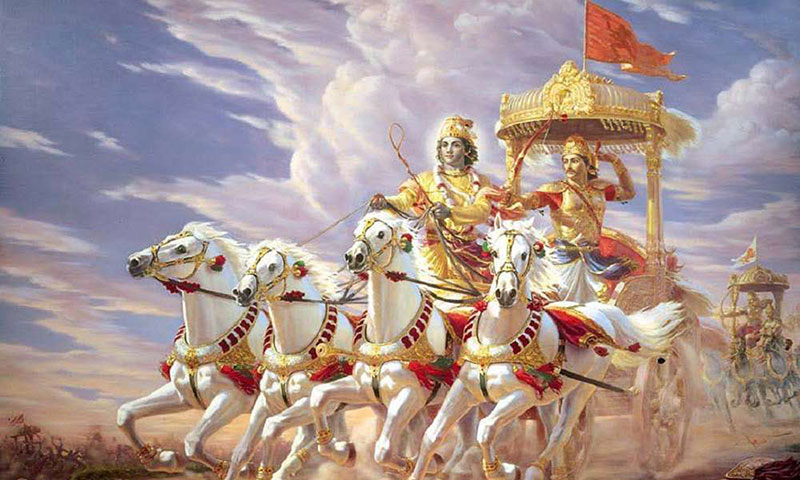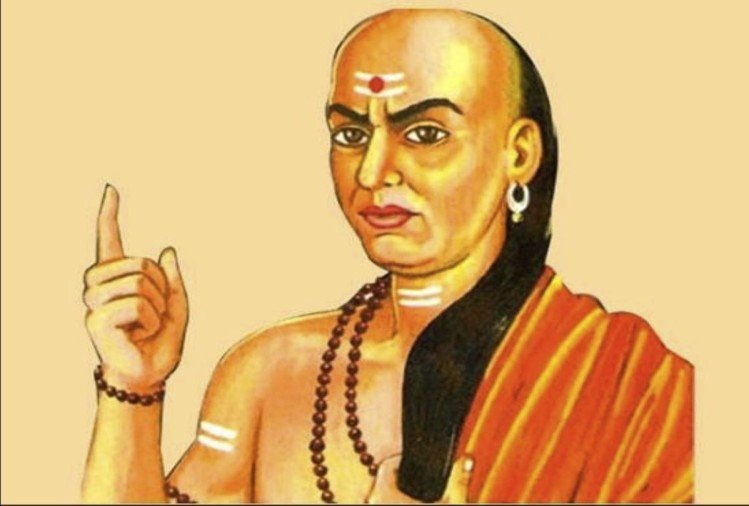Srimad Bhagawad Gita कर्मयोगः अथ श्रीमद्भगवद्गीता ॥ कर्मयोगः | अथ तृतीयोऽध्यायः
atha śrīmadbhagavadgītā atha tṛtīyo’ dhyāyaḥ | karmayogaḥ
अर्जुन उवाच ।
ज्यायसी चेत्कर्मणस्ते मता बुद्धिर्जनार्दन ।
तत्किं कर्मणि घोरे मां नियोजयसि केशव ॥ ३- १ ॥
Arjuna said:
If in Your opinion, O Janārdana, knowledge is superior to action, then why do You, O Keshava, engage me in this
terrific action?
व्यामिश्रेणेव वाक्येन बुद्धिं मोहयसीव मे ।
तदेकं वद निश्चित्य येन श्रेयोऽहमाप्नुयाम् ॥ ३- २ ॥
By (these) apparently conflicting words You seem to confuse my understanding; tell (me) definitely that one thing by which I can attain final beatitude.
श्रीभगवानुवाच ।
लोकेऽस्मिन् द्विविधा निष्ठा पुरा प्रोक्ता मयानघ ।
ज्ञानयोगेन साङ्ख्यानां कर्मयोगेन योगिनाम् ॥ ३- ३ ॥
The Blessed Lord said:
O sinless one (Arjuna), a twofold faith has been declared by Me earlier for the human race; the way of knowledge for
the Sānkhyas, and the way of action for the Yogis.
न कर्मणामनारम्भान्नैष्कर्म्यं पुरुषोऽश्नुते ।
न च संन्यसनादेव सिद्धिं समधिगच्छति ॥ ३- ४ ॥
By not doing work a person does not reach inactivity, nor does he attain perfection by mere renunciation (of action).
न हि कश्चित्क्षणमपि जातु तिष्ठत्यकर्मकृत् ।
कार्यते ह्यवशः कर्म सर्वः प्रकृतिजैर्गुणैः ॥ ३- ५ ॥
Verily, no one ever remains inactive even for a moment; for all are forcibly made to act by the qualities born of Prakriti.
कर्मेन्द्रियाणि संयम्य य आस्ते मनसा स्मरन् ।
इन्द्रियार्थान्विमूढात्मा मिथ्याचारः स उच्यते ॥ ३- ६ ॥
That fool, who (outwardly) controlling the organs of action keeps dwelling on sense-objects with the mind, is called a hypocrite.
यस्त्विन्द्रियाणि मनसा नियम्यारभतेऽर्जुन ।
कर्मेन्द्रियैः कर्मयोगमसक्तः स विशिष्यते ॥ ३- ७ ॥
But he, O Arjuna, who controlling the organs by the mind, performs Karma-Yoga with the organs of action,
being unattached – he excels.
Srimad Bhagwad gita कर्मयोगः – संपूर्ण रामायण पढ़ने के लिए यहां क्लिक करें
नियतं कुरु कर्म त्वं कर्म ज्यायो ह्यकर्मणः ।
शरीरयात्रापि च ते न प्रसिद्ध्येदकर्मणः ॥ ३- ८ ॥
Perform the prescribed duties; for action is superior to inaction; moreover, if you are inactive, even the
maintenance of your body will be impossible.
यज्ञार्थात्कर्मणोऽन्यत्र लोकोऽयं कर्मबन्धनः ।
तदर्थं कर्म कौन्तेय मुक्तसङ्गः समाचर ॥ ३- ९ ॥
This world is bound by action other than that done for sacrifice; (therefore) perform actions for the sake of that,
O son of Kunti (Arjuna), free from attachment.
सहयज्ञाः प्रजाः सृष्ट्वा पुरोवाच प्रजापतिः ।
अनेन प्रसविष्यध्वमेष वोऽस्त्विष्टकामधुक् ॥ ३- १० ॥
Prajāpati, creating of yore, beings who co-exist with a sacrifice, said: “By this you multiply, let this yield you
covetable objects of desire.”
देवान्भावयतानेन ते देवा भावयन्तु वः ।
परस्परं भावयन्तः श्रेयः परमवाप्स्यथ ॥ ३- ११ ॥
By this entertain the gods and let the gods entertain you; entertaining each other you will both attain supreme good.
इष्टान्भोगान्हि वो देवा दास्यन्ते यज्ञभाविताः ।
तैर्दत्तानप्रदायैभ्यो यो भुङ्क्ते स्तेन एव सः ॥ ३- १२ ॥
Being entertained by sacrifices the gods will surely bestow on you the desired enjoyments. He who enjoys what is given by them without offering it to them, is indeed a thief.
Srimad Bhagwad gita कर्मयोगः – संपूर्ण रामायण पढ़ने के लिए यहां क्लिक करें
यज्ञशिष्टाशिनः सन्तो मुच्यन्ते सर्वकिल्बिषैः ।
भुञ्जते ते त्वघं पापा ये पचन्त्यात्मकारणात् ॥ ३- १३ ॥
The good who partake of the remnants of a sacrifice are freed from all sins; but those sinful persons who cook
for their own sake, partake of sin.
अन्नाद्भवन्ति भूतानि पर्जन्यादन्नसम्भवः ।
यज्ञाद्भवति पर्जन्यो यज्ञः कर्मसमुद्भवः ॥ ३- १४ ॥
Beings are born from food, food is produced from rain, rain comes from a sacrifice, and a sacrifice results from action.
कर्म ब्रह्मोद्भवं विद्धि ब्रह्माक्षरसमुद्भवम् ।
तस्मात्सर्वगतं ब्रह्म नित्यं यज्ञे प्रतिष्ठितम् ॥ ३- १५ ॥
Know that action originates from Brahman (the Veda), and Brahman originates from the Imperishable. Therefore
the all-pervading Brahman (Veda) eternally rests in the sacrifice.
एवं प्रवर्तितं चक्रं नानुवर्तयतीह यः ।
अघायुरिन्द्रियारामो मोघं पार्थ स जीवति ॥ ३- १६ ॥
He who does not follow here this cycle thus set revolving, who leads a sinful life and delights in the senses, in vain,
O Pārtha (Arjuna), does he live.
यस्त्वात्मरतिरेव स्यादात्मतृप्तश्च मानवः ।
आत्मन्येव च सन्तुष्टस्तस्य कार्यं न विद्यते ॥ ३- १७ ॥
But that person who delights only in the Self, is satisfied with the Self, is contented in the Self alone, has no duties to perform.
नैव तस्य कृतेनार्थो नाकृतेनेह कश्चन ।
न चास्य सर्वभूतेषु कश्चिदर्थव्यपाश्रयः ॥ ३- १८ ॥
He has nothing to gain by action or (lose) by inaction in this world;nor does he depend on any being for attaining his purpose.
Srimad Bhagwad gita कर्मयोगः – संपूर्ण रामायण पढ़ने के लिए यहां क्लिक करें
तस्मादसक्तः सततं कार्यं कर्म समाचर ।
असक्तो ह्याचरन्कर्म परमाप्नोति पूरुषः ॥ ३- १९ ॥
Therefor always perform action which has to be done, unattached; verily, man attains the highest by performing action unattached.
कर्मणैव हि संसिद्धिमास्थिता जनकादयः ।
लोकसंग्रहमेवापि सम्पश्यन्कर्तुमर्हसि ॥ ३- २० ॥
By action alone Janaka and others realized perfection. Even considering the incentive to people you should
perform action.
यद्यदाचरति श्रेष्ठस्तत्तदेवेतरो जनः ।
स यत्प्रमाणं कुरुते लोकस्तदनुवर्तते ॥ ३- २१ ॥
Whatever a great man does others also copy; that which he accepts as authority, people only follow.
न मे पार्थास्ति कर्तव्यं त्रिषु लोकेषु किञ्चन ।
नानवाप्तमवाप्तव्यं वर्त एव च कर्मणि ॥ ३- २२ ॥
I have no duty to perform, O Pārtha (Arjuna), nor is there anything in the three worlds unattained which is to be
attained, still I am engaged in action.
यदि ह्यहं न वर्तेयं जातु कर्मण्यतन्द्रितः ।
मम वर्त्मानुवर्तन्ते मनुष्याः पार्थ सर्वशः ॥ ३- २३ ॥
If ever I cease to be vigilantly engaged in action, O Pārtha, (then) people (would) follow My footsteps in every way.
Srimad Bhagwad gita कर्मयोगः – संपूर्ण रामायण पढ़ने के लिए यहां क्लिक करें
उत्सीदेयुरिमे लोका न कुर्यां कर्म चेदहम् ।
सङ्करस्य च कर्ता स्यामुपहन्यामिमाः प्रजाः ॥ ३- २४ ॥
If I cease doing work, these worlds would be ruined, and I should be causing an admixture of castes and destroy these beings.
सक्ताः कर्मण्यविद्वांसो यथा कुर्वन्ति भारत ।
कुर्याद्विद्वांस्तथासक्तश्चिकीर्षुर्लोकसंग्रहम् ॥ ३- २५ ॥
As the ignorant perform action being attached to it, even so, O descendant of Bharata (Arjuna), should the wise
perform action unattached, desiring the welfare of the world.
न बुद्धिभेदं जनयेदज्ञानां कर्मसङ्गिनाम् ।
जोषयेत्सर्वकर्माणि विद्वान्युक्तः समाचरन् ॥ ३- २६ ॥
The wise man should not unsettle the faith of the ignorant who are attached to work. He should make them devoted to
all work, performing action himself intently.
प्रकृतेः क्रियमाणानि गुणैः कर्माणि सर्वशः ।
अहङ्कारविमूढात्मा कर्ताहमिति मन्यते ॥ ३- २७ ॥
Actions are done in all cases by the Gunas of Prakriti. He whose mind is deluded through egoism thinks, ‘I am the doer.’
तत्त्ववित्तु महाबाहो गुणकर्मविभागयोः ।
गुणा गुणेषु वर्तन्त इति मत्वा न सज्जते ॥ ३- २८ ॥
But he who knows, O mighty-armed one, the truth as to the differentiation of the senses (Gunas) and their functions
(from the Self) – he knowing that the Gunas or senses, rest in the Gunas or sense-objects, is not attached.
प्रकृतेर्गुणसम्मूढाः सज्जन्ते गुणकर्मसु ।
तानकृत्स्नविदो मन्दान्कृत्स्नविन्न विचालयेत् ॥ ३- २९ ॥
Being deluded by the constituents of Prakriti (Nature), People get attached to the senses and their functions.
He who knows everything should not unsettle these people who are dull-witted and imperfect in knowledge.
Srimad Bhagwad gita कर्मयोगः – संपूर्ण रामायण पढ़ने के लिए यहां क्लिक करें
मयि सर्वाणि कर्माणि संन्यस्याध्यात्मचेतसा ।
निराशीर्निर्ममो भूत्वा युध्यस्व विगतज्वरः ॥ ३- ३० ॥
Renouncing all actions in Me, with your mind resting on the Self, and giving up hope and idea of ownership, fight,
being free from fever.
ये मे मतमिदं नित्यमनुतिष्ठन्ति मानवाः ।
श्रद्धावन्तोऽनसूयन्तो मुच्यन्ते तेऽपि कर्मभिः ॥ ३- ३१ ॥
Those men who ever practice this teaching of Mine with faith and without caviling, are also freed from actions.
ये त्वेतदभ्यसूयन्तो नानुतिष्ठन्ति मे मतम् ।
सर्वज्ञानविमूढांस्तान्विद्धि नष्टानचेतसः ॥ ३- ३२ ॥
But those who carp at this teaching of Mine and do not practice it – know such fools, bereft of all knowledge, to be doomed.
सदृशं चेष्टते स्वस्याः प्रकृतेर्ज्ञानवानपि ।
प्रकृतिं यान्ति भूतानि निग्रहः किं करिष्यति ॥ ३- ३३ ॥
Even a wise man acts according to his own disposition; beings follow (their) nature; what can restraint do?
इन्द्रियस्येन्द्रियस्यार्थे रागद्वेषौ व्यवस्थितौ ।
तयोर्न वशमागच्छेत्तौ ह्यस्य परिपन्थिनौ ॥ ३- ३४ ॥
In respect of each of the senses, attachments and aversions to objects are fixed. One should not come under their
sway, for they are impediments in one’s way.
Srimad Bhagwad gita कर्मयोगः – संपूर्ण रामायण पढ़ने के लिए यहां क्लिक करें
श्रेयान्स्वधर्मो विगुणः परधर्मात्स्वनुष्ठितात् ।
स्वधर्मे निधनं श्रेयः परधर्मो भयावहः ॥ ३- ३५ ॥
Better is one’s own duty, though defective, than another’s duty well performed. Death in one’s own duty is better; the duty of another is fraught with fear.
अर्जुन उवाच ।
अथ केन प्रयुक्तोऽयं पापं चरति पूरुषः ।
अनिच्छन्नपि वार्ष्णेय बलादिव नियोजितः ॥ ३- ३६ ॥
Arjuna said:
Prompted by what, does a man commit sin, even though unwilling, O Vārshneya (Sri Krishna), being constrained as it were, by force?
श्रीभगवानुवाच ।
काम एष क्रोध एष रजोगुणसमुद्भवः ।
महाशनो महापाप्मा विद्ध्येनमिह वैरिणम् ॥ ३- ३७ ॥
The Blessed Lord said:
This is desire, this is anger, born of the constituent (of Prakriti called) Rajas – of inordinate appetite and most
sinful. Know it to be an enemy here.
धूमेनाव्रियते वह्निर्यथादर्शो मलेन च ।
यथोल्बेनावृतो गर्भस्तथा तेनेदमावृतम् ॥ ३- ३८ ॥
As fire is enveloped by smoke, as a mirror is covered by dust, as a foetus is enveloped by the amnion, even so is this covered by it.
आवृतं ज्ञानमेतेन ज्ञानिनो नित्यवैरिणा ।
कामरूपेण कौन्तेय दुष्पूरेणानलेन च ॥ ३- ३९ ॥
O son of Kunti (Arjuna), knowledge is covered by this eternal enemy of the wise in the form of desire, which is
like an insatiable fire.
Srimad Bhagwad gita कर्मयोगः – संपूर्ण रामायण पढ़ने के लिए यहां क्लिक करें
इन्द्रियाणि मनो बुद्धिरस्याधिष्ठानमुच्यते ।
एतैर्विमोहयत्येष ज्ञानमावृत्य देहिनम् ॥ ३- ४० ॥
The senses, the mind, and the intellect are said to be its seat; covering knowledge by these, it deludes the embodied being.
तस्मात्त्वमिन्द्रियाण्यादौ नियम्य भरतर्षभ ।
पाप्मानं प्रजहि ह्येनं ज्ञानविज्ञाननाशनम् ॥ ३- ४१ ॥
Therefore, controlling the senses at the very outset, O best of the Bharatas (Arjuna), kill this sinful thing
which destroys realization and knowledge.
इन्द्रियाणि पराण्याहुरिन्द्रियेभ्यः परं मनः ।
मनसस्तु परा बुद्धिर्यो बुद्धेः परतस्तु सः ॥ ३- ४२ ॥
The senses are said to be superior (to their objects); superior to the senses is the mind; superior to the mind is the intellect; which is superior to the intellect is the Self.
एवं बुद्धेः परं बुद्ध्वा संस्तभ्यात्मानमात्मना ।
जहि शत्रुं महाबाहो कामरूपं दुरासदम् ॥ ३- ४३ ॥
Worshipping whom with devotion through the performance of their duties, the wise have attained Liberation, that Krishna, the supreme Bliss, should be propitiated through all acts.
ॐ तत्सदिति श्रीमद्भगवद्गीतासूपनिषत्सु
ब्रह्मविद्यायां योगशास्त्रे श्रीकृष्णार्जुनसंवादे
कर्मयोगो नाम तृतीयोऽध्यायः ॥ ३ ॥



